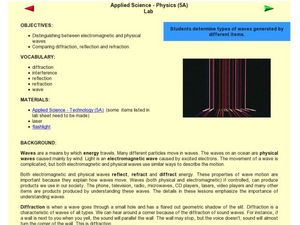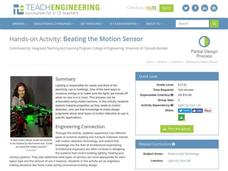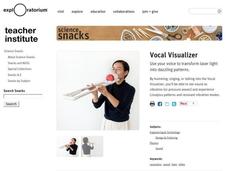Curated OER
Electromagnetic and Physical Waves
Students compare and contrast electromagnetic and physical waves. In this wave lesson plan, students discover that all waves reflect, refract, and diffract energy. Students work in small groups to experiment with waves and evaluate the...
Curated OER
Interactive Online Light Activity
Students participate in an online interactive activity in which they discover types of light, wavelengths of light, and how astronomers use different wavelengths. Activity includes links for other activities and lab activities including...
Exploratorium
Cylindrical Mirror
Using flexible mirror-like paper, physical scientists experiment with images produced by curving it and looking into its reflective surface. They find that concave mirrors cause reflected light waves to cross and actually flip the image...
International Technology Education Association
Make a Pinhole Camera
With a little light and a lot of time, you can create some amazing images. This NASA-related task instructs pupils to build a pinhole camera. The lesson provides suggestions for different pictures to try with the pinhole camera and...
NASA
The Electromagnetic Spectrum
Did you realize the visible light spectrum is less than three percent of the electromagnetic spectrum? A hands-onlesson includes five activities and experiments for scholars to explore and discover many advanced science concepts. They...
Teach Engineering
Beating the Motion Sensor
I bet I can cross the room without having the lights come on. Class members set up an experiment in which they try to determine what materials will mask motion detected by a sensor. Groups predict how materials will interact with light,...
Curated OER
Communication Delay
Construct a maze in your classroom and have a blindfolded scientist act as a space rover, maneuvering unfamiliar terrain while another scientist plays commander. Classmates record the number of occurrences of the commander having to...
Teach Engineering
Quantum Dots and Colors
Introduce teams to quantum dot solutions with an activity that has them expose solutions to a blacklight, observe the colors, and take measurements. Groups graph the data and analyze the dependence between particle size and color...
NASA
Speaking in Phases
Hear from deep space. Pupils learn how satellites transfer information back to Earth. They learn about three different ways to modulate radio waves and how a satellite sends information with only 0s and 1s. Using sound, class members...
Exploratorium
Bone Stress
Lighten up a bit with this activity! Use an old-fashioned overhead projector to shine light through a pair of polarizing filters. Place a stressed plastic object in between and display the colors of light waves revealed! Rotate the...
Curated OER
Bioluminescence 2009: Living Light on the Deep Sea Floor Expedition - Now You See Me, Now You Don't
Students examine bioluminescence and camouflage of deep sea creatures. For this deep sea creatures lesson, students investigate the visible and near-visible light spectrum. They work in small groups to complete a light, color, and...
Curated OER
Stations of Light
Student groups rotate through four stations to examine light energy behavior: refraction, magnification, prisms and polarization. They see how a beam of light is refracted (bent) through various transparent mediums. Young scholars...
Curated OER
My World is Upside Down
Students observe a demonstration on light. They construct a pinhole viewer, and explore and discuss the concept that light travels in a straight line.
Exploratorium
Moire Patterns
By overlapping combs and window screening and by looking at a printed set of consecutively larger circles, learners observe Moire patterns, which provide a visual of what happens during wave interference.
Exploratorium
Polarized Sunglasses
Reflected waves of light move within a plane, and because of this, polarizing materials can reduce the glare our eyes see. This resource explains how to set up a demonstration of this effect. Consider it for use in your physical science...
Curated OER
Using Bubbles to Learn about Light Interference
Students explain the wave properties of light.
Curated OER
The Grating Spectrometer; Light and Wavelengths
Students create a paper model that demonstrates wave interference for 3 wavelength from 2 sources. In this light and wave instructional activity, students use a real spectrometer and observe and measure the wavelength of spectral lines....
Curated OER
Check Out Lights and Shields with Beads
Learners explore Ultraviolet detecting beads and conduct several investigations with them. In this investigative lesson students participate in an experiment to see the harmful effects of UV light and discuss their findings.
Curated OER
Light & Crystals
Learners observe a demonstration of light refraction. They experiment with disappearing crystals to further study light refraction.
Colorado State University
Why Are Clouds White?
Is it possible to change the color of clouds? A three-part activity explores the scattering of light by the water droplets that make up clouds. After observing a demonstration, curious scholars conduct their own investigations of the...
Exploratorium
Vocal Visualizer
Make sound visible with an activity that provides directions for how to build a vocal visualizer meant to create light patterns. Making noise into the visualizer causes a mirror to vibrate, reflecting a laser beam, and creating the...
Colorado State University
Can You See Beyond the Rainbow?
There's more to light than ROYGBIV! An enlightening laboratory investigation has learners explore the world of infrared light. When they use goggles that take away visible light, they experience how things look with only infrared light.
Messenger Education
Sensing the Invisible: The Herschel Experiment
The electromagnetic spectrum includes everything from very powerful gamma rays (which are used to treat cancer) to much weaker radio waves (which include microwaves). Through a hands-on activity, scholars explore the temperature...
Curated OER
Sound Waves
Sixth graders discover how sound is made from vibration and moves in all directions from the source in waves. They see that sound waves can be "seen" if they are translated into light. An excellent experiment is imbedded in this lesson...

























